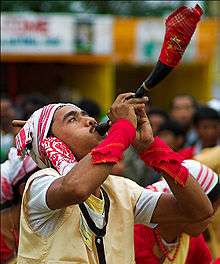Pepa (instrument)
The pepa is a hornpipe musical instrument that is used in traditional music in Assam, India. It is usually made with the horn of a buffalo.[1]


Significance
"Pepa" is a hornpipe which has been used during Bihu celebrations since ancient times. It was mostly blown by the Deori priests in olden times to imitate the music needed to summon Tian gods, much like the Shofar used by Jews. Instruments similar to Pepa are also found among other Bodo-Kachari groups like Garo[2][3], Tripuri[4], Dimasa[5], etc. The Tibetans, Khmers(Austroasiatic) and ancient Chinese also used similar instruments named Rwa-dun and Sneng for religious rituals. Later, it was used as a musical instrument for festive occasions like Bihu. An improved version of Pepa was also developed in the Chutia kingdom which was known as Kaali(made of copper) as mentioned in Deodhai Buranji(where Ahom king Suhungmung brought in Kaali instruments from Sadiya to Sibsagar).[6]

As the buffalo population is dwindling gradually in Assam due to shrinking pastoral lands, getting a pepa is currently very difficult. Cost of a pepa in market has even reached ₹2500 in recent years.
References
- Dilip Ranjan Barthakur (2003). The Music and Musical Instruments of North Eastern India. Mittal Publications. pp. 116–. ISBN 978-81-7099-881-5.
- Buffalo-horn is used as a music instrument among Garos
- Picture of a man playing a Garo Buffalo-horn
- Tripuri Horn Trumpet
- Dimasa Muri trumpet
- Baruah, Swarnalata. Chutia Jaatir Buranji. 2007, p. 350.